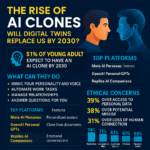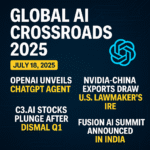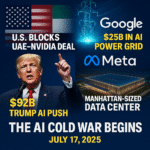Now Reading: Global AI Crossroads 2025: OpenAI’s Agent Revolution, Nvidia–China Tensions, Corporate Crashes, and India’s Fusion AI Push
-
01
Global AI Crossroads 2025: OpenAI’s Agent Revolution, Nvidia–China Tensions, Corporate Crashes, and India’s Fusion AI Push
Global AI Crossroads 2025: OpenAI’s Agent Revolution, Nvidia–China Tensions, Corporate Crashes, and India’s Fusion AI Push

Global AI Crossroads 2025: OpenAI’s Agent Revolution, Nvidia–China Tensions, Corporate Crashes, and India’s Fusion AI Push
🚀 The AI Battlefield Heats Up
The global AI race just took a dramatic turn this week, with OpenAI, Nvidia, C3.ai, and India’s tech sector all making headlines in ways that could reshape the industry’s balance of power. From groundbreaking product launches to geopolitical standoffs and corporate turbulence, July 2025 is proving to be a pivotal month in the artificial intelligence arms race.
🧠 OpenAI Launches ChatGPT Agent: The Birth of an Autonomous Digital Colleague
In a move being called the most significant upgrade since GPT-4, OpenAI unveiled its ChatGPT Agent, an AI assistant capable of autonomously executing multi-step tasks.
Unlike traditional chatbots, the new Agent can:
- Browse the internet in real time
- Analyze datasets directly in your cloud storage
- Manage Gmail, Google Drive, and GitHub interactions
- Trigger complex workflows without manual prompts
Available to Plus, Pro, and Team subscribers starting this week, the Agent introduces built-in safety guardrails to prevent misuse, a direct response to concerns around autonomous AI decision-making.
“We are witnessing the first generation of truly useful AI co-workers,” said an OpenAI spokesperson. “The Agent isn’t just answering questions—it’s getting work done.”
⚔ Nvidia–China Tech Tensions Resurface
While OpenAI’s announcement dominated Silicon Valley, Washington was busy debating technology exports.
U.S. Congressman John Moolenaar has raised objections to the Department of Commerce’s decision to resume Nvidia H20 GPU shipments to China.
His warning was stark: these chips could power China’s military AI and surveillance networks.
With the H20 positioned as a high-performance alternative for AI inference workloads, any green light for export is seen as a significant geopolitical concession.
Analysts warn this could intensify the AI arms race between the U.S. and China.
📉 C3.ai’s $70M Reality Check
On the corporate front, AI software provider C3.ai sent shockwaves through Wall Street after revealing preliminary Q1 results far below expectations:
| Metric | Expected | Actual |
|---|---|---|
| Revenue | $104M | $70M |
| Operating Loss | $38M | $76M |
The 33% revenue shortfall and double-sized losses triggered a 19% stock drop in after-hours trading. Investors cite slower enterprise adoption of C3.ai’s platform and increasing competition from Microsoft Azure AI and AWS Bedrock.
🌏 India’s First Fusion AI Summit: A New Power Emerges
In a sign of AI’s accelerating global reach, Vizag, Andhra Pradesh will host the Fusion AI Summit on July 25–26, 2025. The event’s theme—Turning AI Potential into Action—will focus on AI integration across agriculture, healthcare, and energy.
Confirmed participants include Nvidia executives, government AI policy leaders, and over 50 startups.
India’s positioning as a neutral AI development hub could make it an alternative arena for innovation amid U.S.–China rivalry.
📊 The Bigger Picture
What ties these stories together is the convergence of technological progress, political strategy, and economic turbulence:
- Autonomous AI agents (OpenAI) are moving from research labs to business desktops.
- Chip supply chains (Nvidia–China) are becoming geopolitical flashpoints.
- Corporate AI strategies (C3.ai) face market reality checks.
- Emerging markets (India) are stepping up as innovation ecosystems.
Industry analysts estimate the global AI market will surpass $2.1 trillion by 2030, but with that growth comes increased volatility and competition.





























